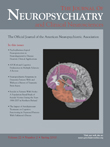Delirium Caused by Intramuscular Administration of Biperiden
To the Editor: A 63-year-old woman was admitted to the internal medicine ward to undergo chemotherapy for metastatic hepatoma of unknown primary origin. On admission, she experienced chest and lower back pain, and was given a normal dosage fentanyl patch.
On day three of hospitalization, she became talkative and restless, wandering the halls of the ward, and began to complain of anxiety. The physician began a daily regimen of 5 mg IV haloperidol. Her mental status did not improve by day seven, so psychiatry was consulted. The patient complained of an abnormal feeling in her mouth due to thirst. The patient was agitated and restless, was continuously moving around, and would often wander around the hospital. She complained that the restlessness began after being prescribed the fentanyl patch 10 days prior. The patient was orientated only to date and self. From this presentation, a diagnosis of acathisia was surmised. Haloperidol was discontinued and 2 mg/day of cloxazolam was prescribed. In Japan, cloxazolam is prescribed for its antianxiety effects, similar to lorazepam.
However, on day eight the patient was still wandering around the hospital ward, and the psychiatrist administered 5 mg of biperiden intramuscularly. No improvement of the patient’s tendency to wander was observed immediately following the injection, and she became increasingly disoriented. She confused the hospital with her own home and her visiting daughter for a neighbor. She was clearly suffering from delirium; however, her delirium improved the following day.
This case suggests that in cancer patients, administration of biperiden intensifies the cholinergic activity of sedatives such as fentanyl, and may lead to delirium. Delirium induced by biperiden 1 was known well, and we were able to show a real case here.
1. Hewer W, Biedert S: Delirium syndrome in biperiden poisoning. Fortschr Neurol Psychiatr 1988; 56:133–136Google Scholar



